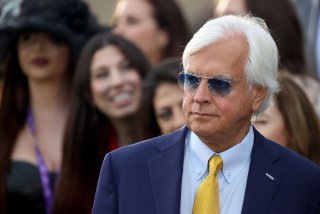Farmer Considers Joining Big Wheels : Cycling: He seeks national criterium championship at Newport Beach in a field that includes Greg LeMond.
- Share via
David Farmer discovered early that not everyone appreciated his obsession with bicycling.
In the fifth grade, he was dropped by a girlfriend who told him to get a life.
More than a decade later, Farmer is one of the United States’ leading professional riders and more discerning with relationships.
He is engaged to Ruthie Mattes, a road racer who won a silver medal at the 1990 World Championships in Japan and a bronze at the World Mountain Bike Championships in Colorado.
“I’m going to marry someone who rides her bike too much, too,” Farmer said.
Farmer has not slowed down despite the early social setback.
Today, he will join 65 others--among them Tour de France winner Greg LeMond--in the Du Pont Cycling race at the Newport Center in Newport Beach. It is the season’s final event.
Farmer, 24, is hoping to become the U.S. Pro Cycling Federation’s national criterium champion with a high finish. He leads the Du Pont series over Coors Light teammate Chris Huber.
LeMond’s entrance makes the Newport Beach event one of the Southland’s best races since the 1984 Olympic Games. Also competing in the 57-mile race around a 1.9-mile course are Olympians Davis Phinney and Alexi Grewal.
Although it is an elite U.S. field, most of the riders--Farmer included--are unknown outside a small circle. Such is the state of U.S. cycling.
That realization was never more evident than last September when Farmer competed in the World Championships.
“I was lining up against the top guys, the ones I’ve only read about,” he said.
Although Farmer often is the team leader in U.S. racing, he knew his place in Japan. With LeMond among the American riders, Farmer was relegated to the role of domestique, or worker.
Farmer obediently took his place in the pecking order. When LeMond fell behind early, Farmer was one of the riders who helped close the gap between the breakaway leaders and the rest.
That effort left him spent, but his job was finished. He dropped out after 100 miles of the 165-mile race.
Still, it was hardly a failure. Farmer helped put LeMond in position to win a third world title. Although LeMond was edged at the finish and placed fourth, Farmer was satisfied.
Exposure to international competition has changed Farmer’s perspective on cycling. Sometimes, he thinks about making the transition to European racing, which is like jumping from triple-A to the majors in baseball.
“(Sometimes) I have the feelings and desires to make the switch, to go the final frontier and be the best of the best,” he said. “I’ve been doing it a long time, but it is not enough to motivate me to go over and live that lifestyle.”
European cycling is a grueling endeavor, particularly for Americans, who must become expatriates to succeed. LeMond lives much of the year in Belgium and learned to speak French to placate European teammates, fans and reporters.
Farmer is not sure which road to travel, but he is content in Boulder, where he spends his free time making wood furniture.
“Dave thinks a lot about the rest of the world,” teammate and friend Todd Gogulski said. “He always questions what we’re doing as bike riders. Some guys get wrapped up in the sport. They don’t think about everything else that is going on.”
Farmer and Gogulski have entered European races and found them enlightening.
Their travails were duly noted during the 1987 Peace Tour, one of the world’s most difficult amateur stages.
The 15-day race started in East Berlin, went through Prague and finished in Warsaw. The cyclists faced East European downpours almost daily, which caused slick conditions.
“Everyone crashed,” Gogulski said. “One guy crashed five times.”
After the long, cold days, the riders returned to hotels that often did not have enough hot water for showers.
Farmer settled in Boulder four years ago after an outstanding junior career. He liked the rustic backdrop of the Rockies and the community’s athletic attitude. Training does not end in winter. The Boulder bikers hike, ride mountain bikes or ski cross-country in the off-season.
Sometimes, however, the community can be confining, which also has an up side.
“I don’t see my teammates in the off-season,” Farmer said. “We all need our distance. We usually reconvene in the spring.”
Farmer gravitated to road racing from BMX riding. He said cycling was one of the few endeavors that left him with positive feelings while growing up in Pennsylvania.
He said he struggled with school, a cause for conflict with his parents. His father is a lawyer, his mother a therapist. They expected him to succeed at the private Quaker school he attended.
His only solace was bicycling.
“BMX was the quickest way to get away from your mother’s call,” Farmer said. “I would cruise around all day, every day with my friend. Something about it mesmerized me. We rode through the woods, along all sorts of out-of-the-way roads.
“For kids, biking really is very liberating. It was an important part of my freedom. I guess it still is.”


